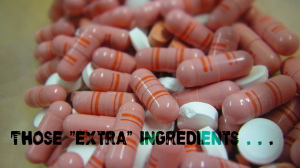The “other” ingredients in your pills…
Could it be that all those “extra” ingredients in your pills – or even skill creams or injections or …. whatever it may be – are causing headaches?
Recently I received an email from Jonathan in Turkey, who explained how he has seen a significant reduction in migraine attacks since going on a gluten free diet. The attacks that he did have he feels were brought on by an extra ingredient in a medical drug – a drug for migraine, no less.
 Many people don’t realize that there are a lot of ingredients in medications beyond the “main” “active” ingredient. The same goes for supplements and vitamins.
Many people don’t realize that there are a lot of ingredients in medications beyond the “main” “active” ingredient. The same goes for supplements and vitamins.
Now most people who are allergic or sensitive to something in particular are going to watch out for those ingredients – looking for labels that say, for example, “gluten free”.
Of course, recently even those labels have been questions in the USA, where allegations were made that some “gluten free” supplements contained – gluten!
All these medications have these extra ingredients – known as excipients. In the industry, the myth was discarded long ago that these ingredients are “inactive”. The reality is that these ingredients can indeed affect your health.
Avoiding “Excipient Reactions”
An article (Pharmaceutical excipients – where do we begin?) in the Australian Prescriber, an independent journal of drugs and therapeutics, offered some suggestions for health professionals who are trying to help patients avoid excipient reactions.
First, watch for those at high risk – ask about allergies, and about other medications and supplements that the patient may be taking.
With this information, you can check the excipients that the patient is already exposed to. Anything they’re allergic to? Are they taking multiple medications/supplements with the same excipients? Are there known side effects to these?
You can also find possible problems by experience – does a different brand of the same medicine work better or alleviate symptoms?
How do I find out which excipients are in my pills?
First, check the packaging. Look on the bottle, or on the paper that came with your medication or vitamin. Take note of what ingredients are there.
If you can’t find the information that way, you can look for the manufacturer’s website, or find national registries (for example, this one in Australia. A site in the USA that may help is RXList).
To find out more about the excipients you’re consuming, look up the name here. Each link will give you basic information. Then you can search online to find more information.
Remember – if you can eat it, someone can complain about it. Just because someone in a forum says that they think that sodium stoerate copolymer 2 is making them sick, doesn’t mean you should throw out all your supplements. Take your time to do your research, talk to your doctor, and if you’re concerned try changing to a different brand or even stopping the supplements for a couple of months (I did say “talk to your doctor”, right? Don’t just stop taking what your doctor has prescribed without talking to her!).
(Side note: online forums are very useful – I’m just saying don’t take one person’s story as a universal truth)
Again, although excipients seem to be generally safe, people in the industry and health fields recognize that these ingredients can cause problems, especially due to mislabelling but also because of sensitivities and allergies that some people have. Just be aware of what you’re putting in your body.
Also see: Q&A: How can I find out which ingredients are in a medication? (USA)
